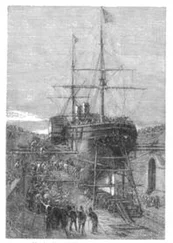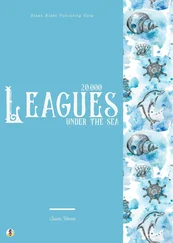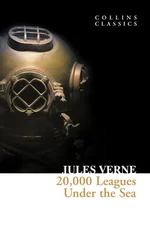Jules Verne - Twenty Thousand Leagues Under the Sea
Здесь есть возможность читать онлайн «Jules Verne - Twenty Thousand Leagues Under the Sea» — ознакомительный отрывок электронной книги совершенно бесплатно, а после прочтения отрывка купить полную версию. В некоторых случаях можно слушать аудио, скачать через торрент в формате fb2 и присутствует краткое содержание. Жанр: sf_writing, на английском языке. Описание произведения, (предисловие) а так же отзывы посетителей доступны на портале библиотеки ЛибКат.
- Название:Twenty Thousand Leagues Under the Sea
- Автор:
- Жанр:
- Год:неизвестен
- ISBN:нет данных
- Рейтинг книги:5 / 5. Голосов: 2
-
Избранное:Добавить в избранное
- Отзывы:
-
Ваша оценка:
- 100
- 1
- 2
- 3
- 4
- 5
Twenty Thousand Leagues Under the Sea: краткое содержание, описание и аннотация
Предлагаем к чтению аннотацию, описание, краткое содержание или предисловие (зависит от того, что написал сам автор книги «Twenty Thousand Leagues Under the Sea»). Если вы не нашли необходимую информацию о книге — напишите в комментариях, мы постараемся отыскать её.
Twenty Thousand Leagues Under the Sea — читать онлайн ознакомительный отрывок
Ниже представлен текст книги, разбитый по страницам. Система сохранения места последней прочитанной страницы, позволяет с удобством читать онлайн бесплатно книгу «Twenty Thousand Leagues Under the Sea», без необходимости каждый раз заново искать на чём Вы остановились. Поставьте закладку, и сможете в любой момент перейти на страницу, на которой закончили чтение.
Интервал:
Закладка:
The Nautilus had to maneuver very carefully so as not to strike against this submarine barrier.
I showed Conseil on the map of the Mediterranean the spot occupied by this reef.
"But if you please, sir," observed Conseil, "it is like a real isthmus joining Europe to Africa."
"Yes, my boy; it forms a perfect bar to the Straits of Lybia, and the soundings of Smith have proved that in former times the continents between Cape Boco and Cape Furina were joined."
"I can well believe it," said Conseil.
"I will add," I continued, "that a similar barrier exists between Gibraltar and Ceuta, which in geological times formed the entire Mediterranean."
"What if some volcanic burst should one day raise these two barriers above the waves?"
"It is not probable, Conseil."
"Well, but allow me to finish, please, sir; if this phenomenon should take place, it will be troublesome for M. Lesseps, who has taken so much pains to pierce the isthmus."
"I agree with you; but I repeat, Conseil, this phenomenon will never happen. The violence of subterranean force is ever diminishing. Volcanoes, so plentiful in the first days of the world, are being extinguished by degrees; the internal heat is weakened; the temperature of the lower strata of the globe is lowered by a perceptible quantity every century to the detriment of our globe, for its heat is its life."
"But the sun?"
"The sun is not sufficient, Conseil. Can it give heat to a dead body?"
"Not that I know of."
"Well, my friend, this earth will one day be that cold corpse; it will become uninhabitable and uninhabited like the moon, which has long since lost all its vital heat."
"In how many centuries?"
"In some hundreds of thousands of years, my boy."
"Then," said Conseil, "we shall have time to finish our journey, that is, if Ned Land does not interfere with it."
And Conseil, reassured, returned to the study of the bank, which the Nautilus was skirting at a moderate speed.
There, beneath the rocky and volcanic bottom, lay outspread a living flora of sponges and reddish cydippes, which emitted a slight phosphorescent light, commonly known by the name of sea-cucumbers; and walking comatul? more than a yard long, the purple of which completely colored the water around.
The Nautilus having now passed the high bank in the Lybian Straits returned to the deep waters and its accustomed speed.
From that time no more mollusks, no more articulates, no more zoophytes; barely a few large fish passing like shadows.
During the night of the 16th and 17th of February, we had entered the second Mediterranean basin, the greatest depth of which was 1,450 fathoms. The Nautilus, by the action of its screw, slid down the inclined planes, and buried itself in the lowest depths of the sea.
On the 18th of February, about three o'clock in the morning, we were at the entrance of the Straits of Gibraltar. There once existed two currents-an upper one, long since recognized, which conveys the waters of the ocean into the basin of the Mediterranean; and a lower counter-current, which reasoning has now shown to exist. Indeed, the volume of water in the Mediterranean, incessantly added to by the waves of the Atlantic, and by rivers falling into it, would each year raise the level of this sea, for its evaporation is not sufficient to restore the equilibrium. As it is not so, we must necessarily admit the existence of an under-current, which empties into the basin of the Atlantic, through the Straits of Gibraltar, the surplus waters of the Mediterranean. A fact, indeed; and it was this counter-current by which the Nautilus profited. It advanced rapidly by the narrow pass. For one instant I caught a glimpse of the beautiful ruins of the temple of Hercules, buried in the ground, according to Pliny, and with the low island which supports it; and a few minutes later we were floating on the Atlantic.
| Go to Contents |
The Atlantic! A vast sheet of water, whose superficial area covers twenty-five millions of square miles, the length of which is nine thousand miles, with a mean breadth of two thousand seven hundred-an ocean whose parallel winding shores embrace an immense circumference, watered by the largest rivers of the world, the St. Lawrence, the Mississippi, the Amazon, the Plata, the Orinoco, the Niger, the Senegal, the Elbe, the Loire, and the Rhine, which carry water from the most civilized, as well as from the most savage countries! Magnificent field of water, incessantly plowed by vessels of every nation, sheltered by the flags of every nation, and which terminates in those two terrible points so dreaded by mariners, Cape Horn, and the Cape of Tempests!
The Nautilus was piercing the water with its sharp spur, after having accomplished nearly ten thousand leagues in three months and a half, a distance greater than the great circle of the earth. Where were we going now, and what was reserved for the future? The Nautilus, leaving the Straits of Gibraltar, had gone far out. It returned to the surface of the waves, and our daily walks on the platform were restored to us.
I mounted at once, accompanied by Ned Land and Conseil. At a distance of about twelve miles, Cape St. Vincent was dimly to be seen, forming the southwestern point of the Spanish peninsula. A strong southerly gale was blowing. The sea was swollen and billowy; it made the Nautilus rock violently. It was almost impossible to keep one's footing on the platform, which the heavy rolls of the sea beat over every instant. So we descended after inhaling some mouthfuls of fresh air.
I returned to my room, Conseil to his cabin; but the Canadian, with a preoccupied air, followed me. Our rapid passage across the Mediterranean had not allowed him to put his project into execution, and he could not help showing his disappointment. When the door of my room was shut, he sat down and looked at me silently.
"Friend Ned," said I, "I understand you; but you cannot reproach yourself. To have attempted to leave the Nautilus under the circumstances would have been folly."
Ned Land did not answer; his compressed lips and frowning brow showed with him the violent possession this fixed idea had taken of his mind.
"Let us see," I continued; "we need not despair yet. We are going up the coast of Portugal again; France and England are not far off, where we can easily find refuge. Now, if the Nautilus, on leaving the Straits of Gibraltar, had gone to the south, if it had carried us toward regions where there were no continents, I should share your uneasiness. But we know now that Captain Nemo does not fly from civilized seas, and in some days I think you can act with security."
Ned Land still looked at me fixedly; at length his fixed lips parted, and he said, "It is for to-night."
I drew myself up suddenly. I was, I admit, little prepared for this communication. I wanted to answer the Canadian, but words would not come.
"We agreed to wait for an opportunity," continued Ned Land, "and the opportunity has arrived. This night we shall be but a few miles from the Spanish coast. It is cloudy. The wind blows freely. I have your word, M. Aronnax, and I rely upon you."
As I was still silent, the Canadian approached me.
"To-night, at nine o'clock," said he. "I have warned Conseil. At that moment, Captain Nemo will be shut up in his room, probably in bed. Neither the engineers nor the ship's crew can see us. Conseil and I will gain the central staircase, and you, M. Aronnax, will remain in the library, two steps from us, waiting my signal. The oars, the mast, and the sail are in the canoe. I have even succeeded in getting in some provisions. I have procured an English wrench, to unfasten the bolts which attach it to the shell of the Nautilus. So all is ready, till to-night."
Читать дальшеИнтервал:
Закладка:
Похожие книги на «Twenty Thousand Leagues Under the Sea»
Представляем Вашему вниманию похожие книги на «Twenty Thousand Leagues Under the Sea» списком для выбора. Мы отобрали схожую по названию и смыслу литературу в надежде предоставить читателям больше вариантов отыскать новые, интересные, ещё непрочитанные произведения.
Обсуждение, отзывы о книге «Twenty Thousand Leagues Under the Sea» и просто собственные мнения читателей. Оставьте ваши комментарии, напишите, что Вы думаете о произведении, его смысле или главных героях. Укажите что конкретно понравилось, а что нет, и почему Вы так считаете.












